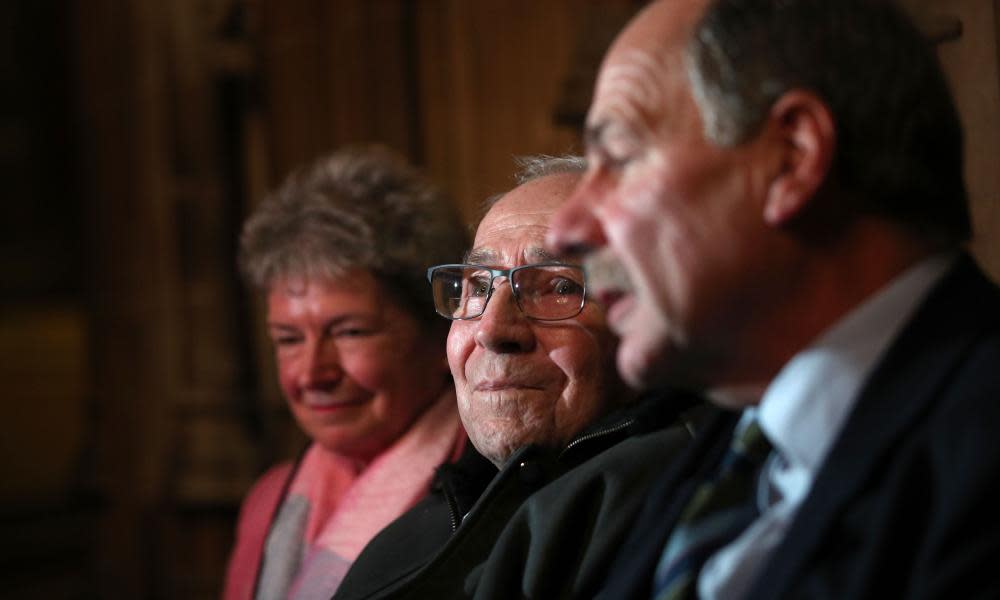Attlee child refugee recalls ‘extraordinary love’ of family

The former child refugee who was looked after by Clement Attlee in the months leading up to the second world war has spoken of the “extraordinary love” he felt from the family, during an emotional reunion with the late prime minister’s descendants.
Paul Willer, 90, waited 79 years to renew his bond with the Attlees, who helped his family escape Nazi Germany.
On Wednesday, he embraced Jo Roundell Greene, Attlee’s granddaughter whose mother, Felicity, helped Willer settle into their home in Stanmore, north-west London.
Sitting on a bench in the central lobby of the Houses of Parliament, Willer was asked for his lasting memory was of four months spent with the Attlees. He paused, before saying: “I think the extraordinary love that was found from the whole family; children and parents.”
The Guardian revealed on Tuesday that the then leader of the opposition had sponsored Willer and his Jewish mother and brother, giving them the confidence and authorisation to leave Germany in 1939 and move to the UK.
After their escape, Attlee invited Willer into their London home, testimony and letters show. The Labour MP neither publicised nor sought to make political capital from his visitor.
Roundell Greene said on Wednesday: “It has been quite an afternoon.
“To take in a child – a lot of people took in refugees, I know – but when you are a prominent figure, to take in another child, it was a great thing to do,” she said.
Willer held Roundell Greene’s hand and cried quietly as she spoke.
“From a personal point of view, it is very humbling to think our grandparents took in another child. To meet Paul today has been the greatest story for me. I feel as if I have got a new bit of the family today. I think we are going to remain friends.”
Earlier on Wednesday, Willer was accompanied by a Guardian reporter as he walked with his daughter Jo to meet Attlee’s descendants in the peers’ entrance to the House of Lords.
As Lord Attlee, the grandson of the former Labour leader,shook his hand, Willer said: “You look just like him.”
Asked how he felt about the media attention – they have had requests for interviews from around the world – Willer said: “It has been a bit much.”
He and his daughter had come to parliament to attend the 80th anniversary of the Kindertransport scheme, which saved thousands of mainly Jewish children from Nazi Germany.
Willer and his younger brother were raised by their mother, Franziska, in the Bavarian town of Würzburg. Their father, Johannes, a Christian, left their mother in 1933, began a new relationship, and declared himself a Nazi sympathiser.
After Kristallnacht in November 1938, Willer’s mother set her hopes on moving to England, but with no money she could only do so if she found others who would promise to look after her children. Two families were eventually found through the church; one of them was the Attlees.
After his arrival in April 1939, Willer found it difficult to communicate with the Attlees because he spoke no English and they understood no German. He said Felicity became the family’s translator because they had both learned basic Latin at school.
Just before the declaration of war in September 1939, Willer was sent to a school in Northern Ireland. He eventually became a sales director at a textiles company, married, had three children and settled in Hertfordshire.
Michael Newman, the chief executive of the Association of Jewish Refugees which organised Wednesday’s event, spoke of his happiness at the reunion.
“The AJR was so pleased to facilitate this poignant reunion as part of the 80th anniversary of the Kindertransport,” he said. “We are so fortunate to have captured Paul’s experiences.”
The association recorded Willer’s interview for its Refugee Voices testimony archive.

 Yahoo News
Yahoo News 
